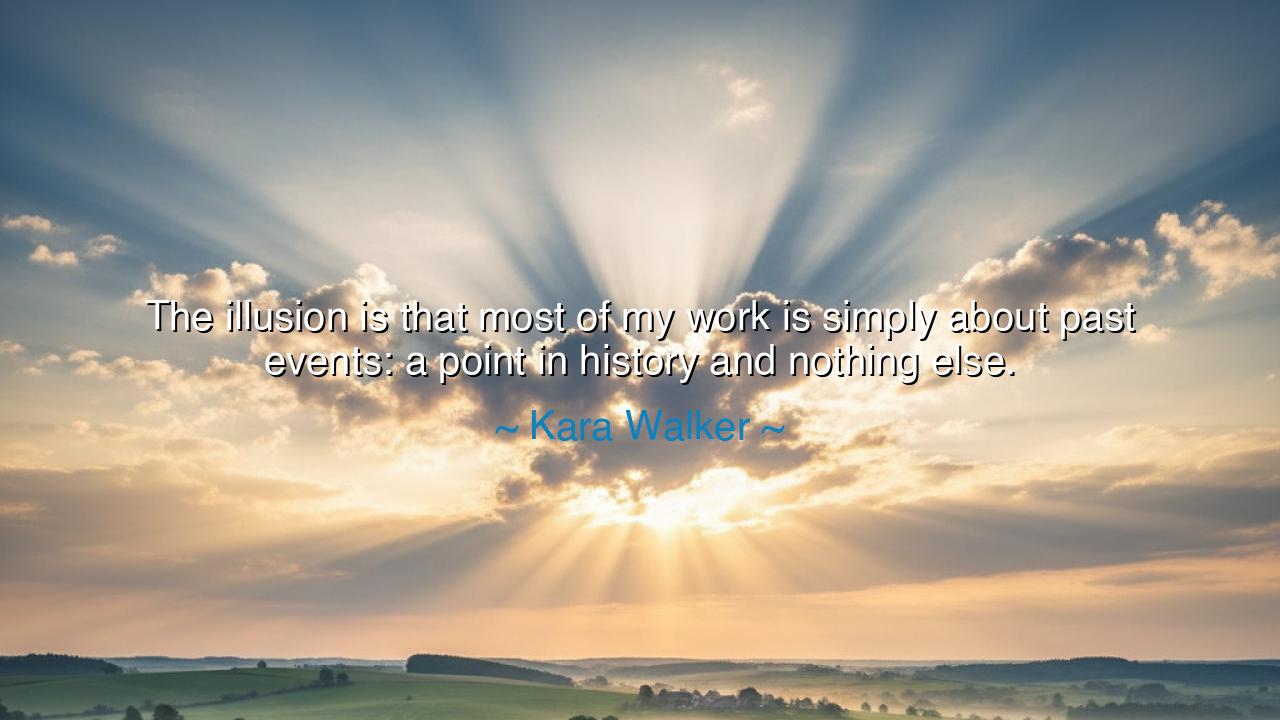
The illusion is that most of my work is simply about past events:
The illusion is that most of my work is simply about past events: a point in history and nothing else.






The artist Kara Walker, whose silhouettes have carved deep into the conscience of modern art, once declared: “The illusion is that most of my work is simply about past events: a point in history and nothing else.” These words, veiled in humility yet burning with truth, expose the misunderstanding of memory and art that so often clouds human perception. Walker reminds us that her work, though rooted in history, is not imprisoned by it. What she creates are not relics of the past, but mirrors for the present—reflections of the same patterns of power, race, gender, and violence that still shape the world today. Her “illusion” is our blindness: the comfort we take in believing that the horrors of the past are buried, when in truth they live still among us.
When Walker speaks of this illusion, she calls attention to the habit of distance—the way societies separate themselves from their own histories, as if guilt or pain were eras that could be neatly concluded. To say her art is “about the past” is to miss its pulse. Her silhouettes, her installations, her haunting tableaux of slavery and oppression, are not nostalgia or documentation. They are living wounds, opened so that we may see what we have refused to confront. The brutality of the slave trade, the violence of colonialism, the quiet persistence of prejudice—these are not “points in history.” They are cycles, recurring under new names, hiding behind new justifications.
The origin of this quote lies in Walker’s long struggle with how her work was received. When her cut-paper silhouettes depicting the grotesque fantasies of antebellum life first appeared, many critics in the West praised them for their “historical commentary.” But Walker saw something far more dangerous: in labeling her art “historical,” people absolved themselves of complicity. By placing her work safely in the past, they avoided the truth that these systems of dominance still thrive. Her statement is, therefore, a challenge: to look again, to see not “then” but “now.” The illusion is not hers—it is ours, sustained by the comfort of forgetfulness.
History itself bears witness to the peril of this illusion. After the American Civil War, the nation celebrated emancipation while allowing new forms of bondage—sharecropping, segregation, and disenfranchisement—to flourish. In South Africa, the end of apartheid was hailed as the dawn of equality, yet the economic scars of oppression remained. And in every generation, the oppressed are told that their pain belongs to yesterday. Kara Walker’s art tears through this myth, demanding that we acknowledge how the past breathes through the present. Her silhouettes, stark in black and white, are not merely visual—they are moral landscapes, forcing the viewer to reckon with what endures in shadow.
In truth, this understanding is ancient. The philosopher Heraclitus wrote that “the river we step into is never the same, yet it is the same river.” So too with history: the faces change, the garments alter, but the current flows unbroken. The wise among the ancients—poets, prophets, teachers—always warned that forgetting is the root of downfall. To see history as “a point and nothing else” is to walk blind upon the same stones that once tripped our ancestors. Walker’s art restores memory to the body, not as nostalgia, but as a warning and a prayer: that we might awaken before the cycle repeats.
Thus, the lesson in her words is clear: do not relegate injustice to the museum of the mind. The past is not finished—it is the soil beneath our feet, shaping what grows today. To confront it is to take responsibility for the present; to deny it is to remain enslaved to its patterns. Every generation must choose whether to repeat or to repair. Walker’s work stands as both mirror and hammer—reflecting what is, and breaking what must be broken.
So, my child, remember this truth: art is never only about what has been—it is about what is becoming. When you look upon the past, do not see it as distance, but as continuity. Learn from it, feel it, let it humble and awaken you. For as Kara Walker teaches, the illusion of separation between past and present is the greatest deception of all. Only when we pierce that illusion, when we dare to see our time reflected in the ghosts of history, will we begin the true work of transformation.






AAdministratorAdministrator
Welcome, honored guests. Please leave a comment, we will respond soon